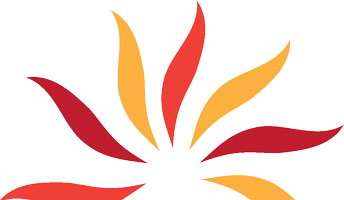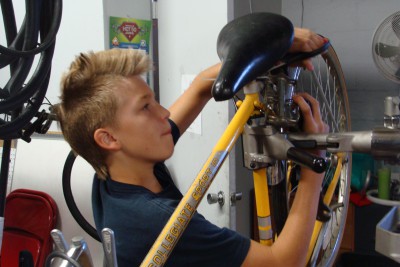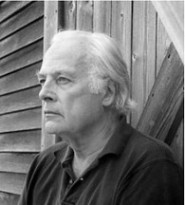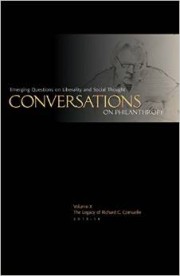Freewheelin’ Dreams
When Nancy Stimson retired from youth ministry in 2004, she had no intention of starting her own non-profit. But then one day her love for kids collided with her interest in cycling, and she couldn’t help herself.
“So I’m just out riding and I see this guy and he’s just flying past me at 25 miles an hour and he had these black lycra shorts with something I’d never seen before—these big block letters BAP.”
Intrigued, she Googled it and discovered that the acronym stood for Bicycle Action Project, an Indianapolis-based earn-a-bike program for kids.
“I remembered when I was a kid and how proud I was when I thought I was fixing my bike . . . just the freedom and joy. And I thought, if a kid earns a bike instead of being given a bike, they’re gonna take better care of it too, like, honor that bike a little bit.”
Stimson decided she was going to volunteer with BAP, but when she tried to find them, she learned that they had closed down. This led her to the inevitable conclusion: she would start her own earn-a-bike program.
Fifteen months later, in June of 2007, Freewheelin’ Community Bikes became a reality in a loaned spaced at Tabernacle Presbyterian Church, an established church in Indianapolis’ Mapleton – Fall Creek neighborhood.
“All we had was a room, a whole batch of kids, and a bike or two,” Nancy says.
But that was enough to get started. Stimson and three part-time bike mechanics began teaching kids the different parts of a typical bicycle.
Six years later, Freewheelin’ is a fixture in the community. Since the organization’s inception, Stimson and her growing team have awarded almost 500 children, ages 10-18, with bikes through the Earn-a-Bike program. They’ve also opened a bicycle resale shop at a storefront across the street from the church.
Character catalyst
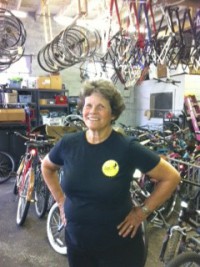
“I’m one of those people who never really stopped riding my bike,” says Nancy Stimson. “I learned at six and never really stopped.”
In the early days, Freewheelin’ drew participants mostly from the neighborhood, lower-income kids who qualified for the Free and Reduced Lunch program. Over the years, word spread and parents started driving their kids in from across the Indianapolis metro area to learn how to refurbish bikes, and pick up some life skills along the way.
“There’s one kind of kid who enjoys our program, and that’s a kid who enjoys bikes,” Stimson points out. “If you don’t enjoy bikes, this is not the right program [for you].”
To earn a bike, a youth must demonstrate proficiency in the basics of bike mechanics, skills they pick up by attending classes on bike maintenance, cleaning, and tool use. Once they have mastered these skills, they can then select a used (often broken) bike—donated from people in the community—from the warehouse behind the store, refurbish it, and take it home.
“I’ve never seen a kid who takes a bike home go home with a sad face,” says Stimson. “His smile is not so much that he’s got the bike, but how proud he is that he created the bike.”
After learning the basics and earning a bike, participants can opt to continue in the program, working their way up the “apron advancement program,” a method Freewheelin’ adapted from the Chicago-based Blackstone Bicycle Works. A participant earns her first apron—the yellow apron—by showing up on time twice. After that, she can earn a green apron (around the same time she’s earning a bike) by mastering skills such as taking a wheel off, changing a tire, cleaning and lubing a chain, adjusting the seat height, and naming the various parts of the bike. Red, purple, and black aprons are for those who want to acquire more advanced skills.
But from Stimson’s perspective, mastery of bike mechanics is merely a byproduct of the real intent behind the project.
“It’s not ultimately about teaching bike mechanics,” she admits. “The bike is the vehicle for teaching life skills and character.”
Life skills such as punctuality, attention to detail, and perseverance.
“You can’t give up just ‘cause you can’t do it,” says Atticus Ryan, a 12-year-old who has earned his red apron.
The program also provides a platform to teach scientific principles like friction and the chemical interactions of various cleaning solutions.
On Saturdays, Stimson steps away from the shop for a few hours to lead kids on bike tours of the city. The two main goals: cultivating a healthy lifestyle and imbuing a spirit of exploration.
“It’s about getting kids hooked on life,” Stimson explains.
Plus, “there’s more [to Indianapolis] than just the Colts, Pacers, and TV.”
Tomorrow’s bike experts
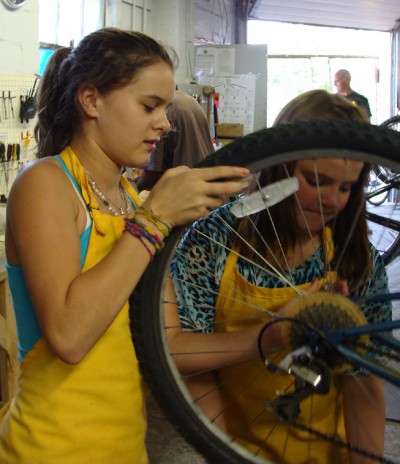 Freewheelin’ operates on a $214,000 annual budget. A little more than a third of their revenue comes from bike shop sales. The rest comes from individual donors, local foundations, and a cadre of corporate sponsors, including a marketing company, a drycleaner, a spa, and a brewery. Not a cent comes from the government.
Freewheelin’ operates on a $214,000 annual budget. A little more than a third of their revenue comes from bike shop sales. The rest comes from individual donors, local foundations, and a cadre of corporate sponsors, including a marketing company, a drycleaner, a spa, and a brewery. Not a cent comes from the government.
“It’s so hard to get that money because there’s so many hoops to jump through and so much reporting you have to do,” Stimson explains. “We choose to spend our hours on what we think are better leads…and where we get a bigger bang for the buck.”
She currently pays five staff members, including an administrative team and a couple of bike mechanics. She has yet to figure out how to pay herself; a hurtle she realizes she’ll have to overcome for the organization to continue sustainably.
The long-term dream is that Freewheelin’ will become an entrepreneurship incubator, starting first by training participants into a job. The goal behind the apron advancement program is that “kids could go to the point where they’re employable at any bike shop anywhere.” Some would be employed at the Freewheelin’ shop where they could be mentored in the elements of running a successful business.
Although this hasn’t happened yet, Stimson is hopeful that kids like Atticus Ryan and many others who come through Freewheelin’ on a regular basis will get there some day.
A year and a half ago, Ryan said he didn’t have any idea how to change a tire on his bike, much less clean it or adjust the derailleur.
“Now I do,” he says confidently.
A homeschooler, Ryan often spends his afternoons with a red apron tied around his neck learning how to clean and repair cast off bikes. Ryan says he wants to graduate from the program at 14 and work in the bike shop after that. Then, upon college graduation, he will open his own bike store.
Despite all the investment and hard work, Stimson, Ryan, and everyone else who spends any amount of time at Freewheelin’, the best part is and always has been the fun of it all. Particularly, the fun of riding.
“I enjoy riding my bike,” Ryan says. “It’s a sensation I don’t get when being driven around in a car or walking.”
